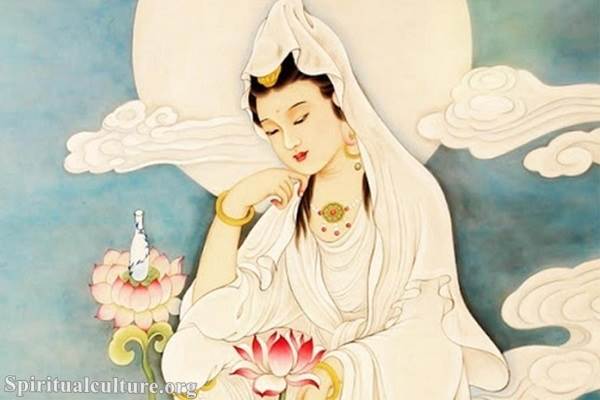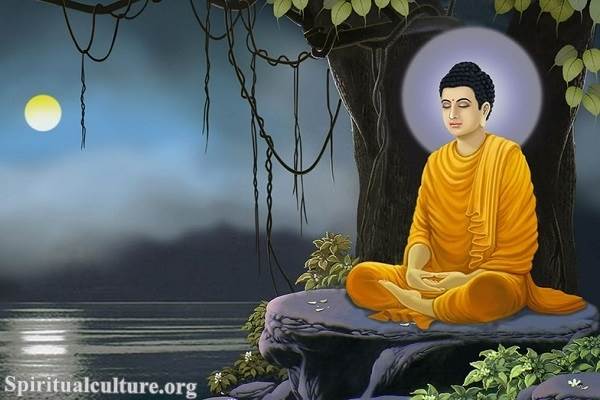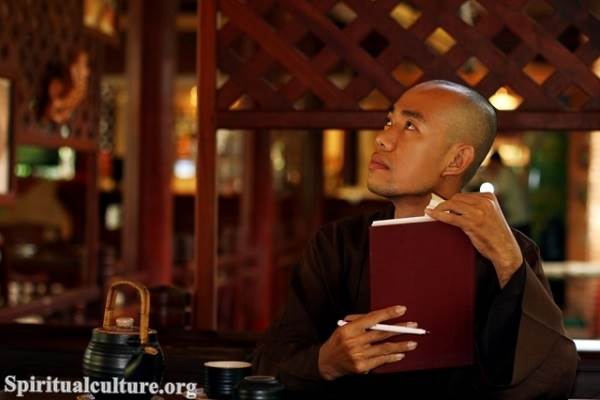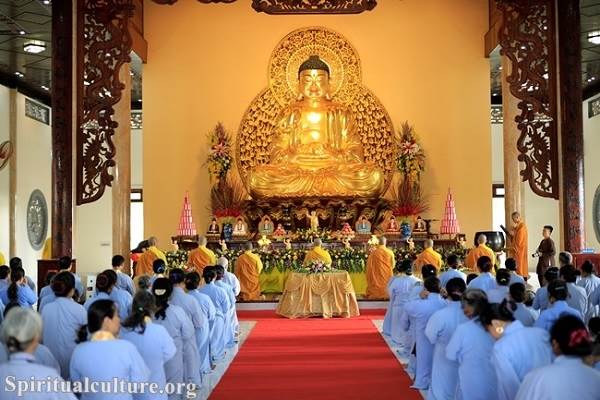Death is one of the most profound and challenging aspects of human existence. Across cultures and philosophies, people have sought to understand and come to terms with the inevitability of death. In Buddhism, the teachings of the Buddha offer deep insights into the nature of life and death, emphasizing impermanence, mindfulness, and the interconnectedness of all things.
In this article, Spiritual Culture delves into the significance of Buddha’s quotes on death, exploring how they guide us in understanding the transient nature of life and how they can help us lead a more meaningful existence.
The Profound Significance of Buddha Quotes on Death
Buddha’s quotes on death hold a special place within his teachings, offering a lens through which we can understand the broader Buddhist philosophy. These quotes are not mere reflections on mortality; they are teachings designed to help us grasp the essence of existence, guiding us toward liberation from suffering. For those who follow the path of Buddhism, these quotes provide solace and wisdom, helping them navigate the complexities of life and death with a sense of peace and purpose.
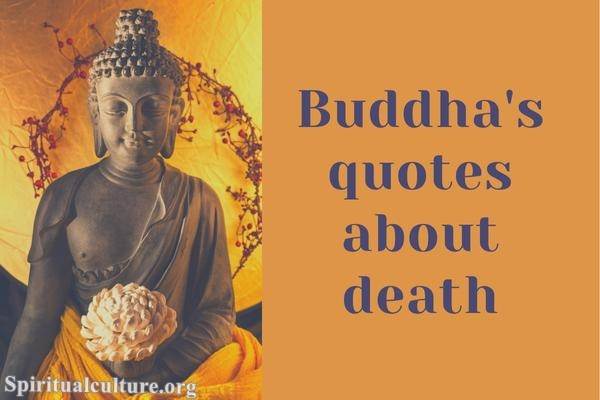
The significance of these quotes lies in their ability to distill complex ideas into simple, yet profound, truths. They remind us that death is not an event to be feared but an integral part of the cycle of life. By embracing these teachings, individuals can cultivate a mindset that is free from the fear of death, allowing them to live more fully and authentically.
Understanding Impermanence: The Cornerstone of Buddha’s Teachings
At the heart of Buddha’s teachings on death is the concept of impermanence, known in Pali as Anicca. Impermanence is the recognition that all things in life—whether material possessions, relationships, or even our own bodies—are transient and subject to change. Buddha taught that the root of much human suffering lies in our attachment to things that are, by nature, impermanent. By understanding and accepting impermanence, we can free ourselves from the suffering that arises from clinging to the illusion of permanence.
In the context of death, impermanence is a powerful reminder that life itself is fleeting. Buddha’s teachings encourage us to see death not as an end, but as a natural continuation of the cycle of existence. This understanding helps us to live with greater mindfulness, appreciating each moment as it comes, and letting go of the fear that often surrounds the concept of death.
Key Quotes Reflecting the Nature of Death
Buddha’s teachings are rich with quotes that reflect on the nature of death, each offering a unique perspective on how we can approach this inevitable aspect of life. Some of the most poignant quotes include:
- “All created things must pass. Strive on, diligently.” This quote encapsulates the essence of impermanence, reminding us that everything we hold dear is subject to change and eventual dissolution. However, it also encourages us to continue striving for enlightenment with diligence, even in the face of life’s transience.
- “This body is a shadow, fragile and impermanent, and destined to perish.” Here, Buddha highlights the fragility of the human body, urging us to recognize its impermanent nature. This awareness can lead to a deeper understanding of the temporary nature of our physical existence, prompting us to focus on the cultivation of the mind and spirit.
- “Death is not to be feared by one who has lived wisely.” In this quote, Buddha offers reassurance that those who live their lives with wisdom and mindfulness need not fear death. It suggests that a life well-lived—one rooted in ethical conduct, compassion, and mindfulness—naturally leads to a peaceful acceptance of death.
These quotes serve as profound reminders of the transient nature of life and encourage us to live with intention and mindfulness, fully embracing the present moment.
The Interconnectedness of Life and Death in Buddhism
In Buddhist philosophy, life and death are not seen as separate or opposing forces but as two interconnected aspects of a continuous cycle. This cycle, known as Samsara, represents the endless cycle of birth, death, and rebirth that all beings are subject to until they attain enlightenment (Nirvana).
Buddha taught that death is not the end of the self but rather a transition from one state of existence to another. This perspective shifts the focus away from fearing death as a final cessation and towards understanding it as a natural part of the journey toward spiritual awakening. This interconnectedness encourages Buddhists to live each moment fully, knowing that their actions in this life have consequences in future existences.
Diligence and Mindfulness: Embracing the Present Moment
One of the key teachings of Buddha is the importance of living with diligence and mindfulness. To live diligently means to approach life with earnestness and effort, fully engaging with the present moment. Mindfulness, on the other hand, is the practice of maintaining a clear and focused awareness of our thoughts, actions, and surroundings.
In the context of death, these practices take on a heightened significance. Buddha emphasized that by being fully present and aware of the transient nature of life, we can live more authentically and without fear. When we live mindfully, we are better able to appreciate the impermanent nature of all things, including life itself, and this awareness naturally leads to a more peaceful acceptance of death.
Mindfulness also teaches us to let go of the past and not worry excessively about the future, focusing instead on the here and now. This approach to life encourages us to make the most of each moment, understanding that every experience is fleeting and should be embraced fully.
Acceptance of Death: A Path to Inner Peace
Buddha’s teachings on death encourage a deep acceptance of this natural process. Acceptance, in this context, is not about resignation but about understanding and embracing the reality of death as an inevitable part of life. By accepting death, we free ourselves from the anxiety and suffering that often accompany thoughts of our mortality.
This acceptance is a crucial step towards inner peace. Buddha taught that by relinquishing our attachment to life and the fear of death, we can cultivate a state of equanimity—an unshakeable calmness that allows us to face life’s challenges with grace and composure. This calm acceptance of death is a testament to the power of Buddha’s teachings, offering a way to transcend the suffering that arises from clinging to life.
Emotional Responses to Death According to Buddha
While Buddha’s teachings emphasize acceptance and mindfulness, he also acknowledged the natural emotional responses that arise in the face of death. Grief, sorrow, and mourning are all part of the human experience, and Buddha taught that these emotions should be recognized and honored.
However, he also advised that we should observe these emotions without becoming attached to them. Buddha’s teachings encourage us to understand the transient nature of our emotions, just as we understand the impermanence of life itself. By observing our emotional responses with mindfulness, we can experience them fully without allowing them to overwhelm us, leading to a more balanced and peaceful state of mind.
Wisdom to Cope with Grief and Loss
Buddha’s wisdom offers valuable guidance for coping with grief and loss, particularly when dealing with the death of a loved one. One of his key teachings is the recognition that all beings are subject to death, and that grief is a natural response to this inevitable loss. However, he also taught that by reflecting on the impermanence of life and the inevitability of death, individuals can find solace and peace.
Buddha’s teachings suggest that rather than resisting grief, we should embrace it as part of the human experience. By doing so, we can transform our suffering into an opportunity for growth and deeper understanding. Through mindfulness and meditation, we can learn to navigate our grief with compassion and wisdom, finding peace even in the midst of loss.
The Transformative Nature of Death in Buddhist Philosophy
In Buddhism, death is viewed not as an end, but as a transformation. This perspective is rooted in the concept of Samsara, the cycle of birth, death, and rebirth. According to Buddhist teachings, death is merely a transition from one state of existence to another, and it is through this cycle that beings evolve spiritually.
This transformative view of death encourages Buddhists to approach it with a sense of openness and curiosity rather than fear. It suggests that death is an opportunity for growth and change, both in this life and in future existences. This perspective can be deeply comforting, offering a way to see death as a continuation of the journey towards enlightenment, rather than as a final conclusion.
Encouragement for a Meaningful Life Through Death Awareness
Buddha’s teachings on death are ultimately about living a meaningful and purposeful life. By keeping the reality of death in mind, we are encouraged to live with greater awareness, compassion, and intention. Death awareness fosters a sense of urgency, prompting us to make the most of each moment and to cultivate positive actions that contribute to our spiritual growth.
Buddha taught that by contemplating death, we can develop a deeper understanding of life’s true nature. This understanding leads to a more profound appreciation of life’s impermanence, motivating us to live in a way that is aligned with our highest values and aspirations. In this way, the awareness of death becomes a powerful tool for living a more meaningful and fulfilling life.
Common Misinterpretations of Buddha’s Views on Death
Despite the clarity and wisdom of Buddha’s teachings on death, they are sometimes misinterpreted. One common misconception is that Buddha’s views on death are morbid or pessimistic. This misunderstanding often arises when the context of his teachings on impermanence and the cycle of rebirth is not fully understood.
In reality, Buddha’s teachings on death are not about inducing fear or despair but about liberating individuals from the suffering that comes from attachment. His teachings encourage us to see death as a natural and inevitable part of life, and to approach it with mindfulness and acceptance. By understanding the true nature of Buddha’s views on death, we can appreciate the depth and compassion that underpin his teachings.
Buddha quotes on death
Buddha death quotes offer a profound understanding of this cycle, providing comfort, wisdom, and guidance in the face of life’s ultimate certainty. Here are some of the most significant Buddha quotes about death:
- “All conditioned things are impermanent — when one sees this with wisdom, one turns away from suffering.” – This quote underlines the transient nature of all things in life. Understanding and accepting this impermanence can help us cope with the inevitability of death and reduce our suffering.
- “Even death is not to be feared by one who has lived wisely.” – The Buddha emphasizes the importance of living a virtuous and mindful life. If we live wisely, death is not something to be feared.
- “Life is uncertain; death is certain.” This quote serves as a reminder of the only certainty in life — death. It urges us to live our lives fully and mindfully, knowing that our time here is limited.
- “To be idle is a short road to death and to be diligent is a way of life; foolish people are idle, wise people are diligent.” Here, the Buddha speaks about the importance of diligence and effort in one’s life. Idleness leads to spiritual death, while diligence leads to spiritual life.
- “To be idle is a short road to death and to be diligent is a way of life; foolish people are idle, wise people are diligent.” – Here, the Buddha speaks about the importance of diligence and effort in one’s life. Idleness leads to spiritual death, while diligence leads to spiritual life.
- “There is no fire like passion, there is no shark like hatred, there is no snare like folly, there is no torrent like greed.” – This quote, though not directly about physical death, speaks to the concept of spiritual death. It warns against the dangers of unchecked emotions and desires, which can lead to our spiritual downfall.
- “All conditioned things are impermanent. Work diligently for your own liberation.” – This quote reminds us that everything in life, including ourselves, is impermanent and subject to change. Therefore, we should strive to attain liberation from suffering and impermanence.
- “The trouble is, you think you have time.” – This quote suggests that we often take time for granted and assume we have plenty of it. In reality, time is limited and precious, and we should make the most of it.
- “Do not dwell in the past, do not dream of the future, concentrate the mind on the present moment.” – This quote encourages us to focus on the present moment and not let our thoughts dwell on the past or future, as that can lead to suffering and anxiety.
- “Life is uncertain, death is certain.” – This quote reminds us that death is an inevitable part of life, and we should live our lives with this knowledge in mind.
- “The root of suffering is attachment.” – This quote suggests that our attachments to things and people can cause suffering and prevent us from attaining inner peace.
- “Better than a thousand hollow words, is one word that brings peace.” – This quote emphasizes the importance of actions over empty words, and how even one word that brings peace can be more powerful than many meaningless ones.
- “It is not death that a man should fear, but he should fear never beginning to live.” – This quote suggests that the fear of death is not as important as the fear of never having truly lived or experienced life to its fullest.
- “Just as a candle cannot burn without fire, men cannot live without a spiritual life.” – This quote highlights the importance of having a spiritual or meaningful purpose in life, as it gives us direction and purpose.
- “In the end, these things matter most: How well did you love? How fully did you live? How deeply did you let go?” – This quote suggests that the most important things in life are love, living fully, and letting go of attachments.
- “In the end, only three things matter: how much you loved, how gently you lived, and how gracefully you let go of things not meant for you.” – This quote emphasizes the importance of love, living a gentle and kind life, and letting go of things that do not serve our higher purpose.
Buddha death quotes provide a unique perspective on death, encouraging us to embrace it as a natural part of life. They teach us to live mindfully, knowing that every moment is precious and impermanent. They guide us to lead a life of wisdom, compassion, and diligence, thereby reducing our fear of death.
Conclusion
Buddha’s quotes on death offer profound insights into the nature of life and the inevitable reality of mortality. Through his teachings, we learn to embrace impermanence, live with mindfulness, and approach death with acceptance and wisdom. By internalizing these lessons, we can lead lives that are more meaningful, compassionate, and free from the fear of death. In the end, Buddha’s wisdom provides a path to inner peace, helping us navigate the complexities of life and death with grace and understanding.
